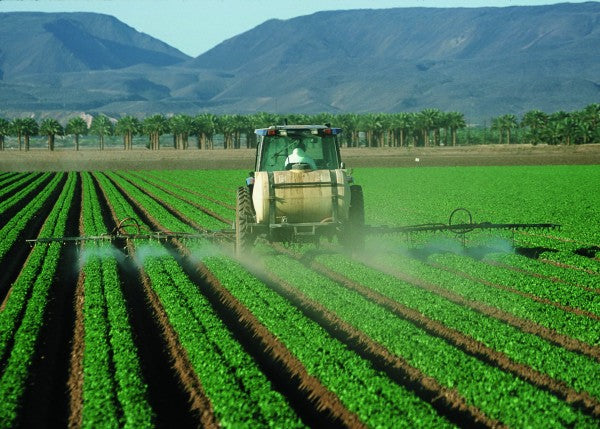
Does Glyphosate Pose a Health Risk in Drinking Water?
By Dan DeBaunShare
Does Glyphosate Pose a Health Risk in Drinking Water?
In August 2018 a jury awarded a dying man $289 million in damages after he claimed glyphosate in Monsanto's common weed killer, Roundup, caused his terminal cancer. Dewayen Johnson, a school groundsman in Benicia, California was diagnosed with non-Hodgkin's lymphoma back in 2014. This landmark lawsuit sets a precedent for over 5,000 plaintiffs across the country filing similar lawsuits.
(Side Note) Yes, the Black Berkey filters have been tested to remove glyphosate to below lab detectable limits of >75%, which was the limitation of the testing equipment.
Glyphosate, the active ingredient in Roundup, is a non-selective herbicide that was discovered in 1973 and commercially produced in 1974. Today it is the most widely applied agricultural chemical on the planet. A 2015 study published in Environmental Sciences Europe revealed that since coming into production in 1974, an alarming 9.4 million tons of glyphosate has been applied to crops and agricultural fields across the world, 1.8 million of which where applied to crops grown on American soil.
Because this chemical is so heavily used, and its use is so widespread, it raises some very important questions. Can it get into our drinking water, and if so, what are the health implications?
The guide below outlines some of the key issues to help you better understand your risk of exposure via your drinking water; explaining how glyphosate can get into your drinking water, and whether it poses a health risk to you and your family if it does.
How does glyphosate get into drinking water?
A 2007 report, titled Public Health Goal for GLYPHOSATE in Drinking Water, suggests that while glyphosate shows an affinity to soil, it can leach into surface water bodies and groundwater systems via two primary pathways: 1) When the herbicide is blown into water bodies that lie adjacent to fields sprayed with Roundup; and 2) Via runoff when sprayed fields are irrigated, which can contaminate water bodies further away. Because glyphosate is stable in water, it does not readily degrade, but rather persists in the aquatic environment.
The most likely route of exposure to humans is by directly inhaling or through skin contact with the chemical, or indirectly by drinking water contaminated with Roundup, or consuming crops that have been sprayed with it.
While the majority of lawsuits currently underway involve plaintiffs who were directly exposed to Roundup after using the product in their gardens, school yards or farms, there have been instances where drinking water facilities have reported glyphosate levels that are higher than the EPA's safety standard for drinking water (0.7 mg/L or 700 ppb) and the much lower level recommended by the Environmental Working Group (0.005 mg/L or 5 parts per billion). In effect, people living in the communities these facilities serve potentially now face a a greater risk of developing cancer than people not exposed to glyphosate in their drinking water.
What Else is Glyphosate Found In?
According to scientists, glyphosate, mainly through its presence in soil and groundwater, is found in many products used every day. During a study conducted by the European Union in 2013, all people tested had traces of the chemical in their body. The most alarming result was that its average concentration was 17 times higher than the limit value.
The chemical itself is primarily found in food products such as breakfast cereals, muesli, cereal bars, bread, confectionery (especially in biscuits). Glyphosate can also contaminate any product containing wheat, maize, oats and soy.
Does exposure to Glyphosate in drinking water pose a health risk?
While Monsanto maintains that Roundup does not cause cancer, the International Agency for Research on Cancer (ISRC) thinks otherwise, listing glyphosate as a Group 2A chemical, meaning it's "probably carcinogenic to humans". Animal studies show a link between cancer and exposure to glyphosate, while the limited observations on humans show that exposure is associated with the development of non-Hodgkin lymphoma. Exposure to glyphosate is also linked to kidney disorders, problems with the reproductive system and impaired fetal growth, as well a disruption to the endocrine system.
Does Berkey Remove Glysophate
The best way to ensure the water you drink is free from potentially harmful glyphosate is to filter it with a good quality drinking water filter. Black Berkey filters have been tested to remove glyphosate to below lab detectable limits of >75%, which was the limitation of the testing equipment — the actual removal rate may be much higher.
-
Regular price $234.00 USDRegular priceUnit price / per
-
Regular price $327.00 USDRegular priceUnit price / per
-
Regular price From $367.00 USDRegular priceUnit price / per
-
Regular price From $408.00 USDRegular priceUnit price / per
-
Regular price From $451.00 USDRegular priceUnit price / per
-
Regular price From $478.00 USDRegular priceUnit price / per
-
Regular price $332.50 USDRegular priceUnit price / per
$350.00 USDSale price $332.50 USDSale

Dan DeBaun
Dan DeBaun is the owner and operator of Big Berkey Water Filters. Prior to Berkey, Dan was an asset manager for a major telecommunications company. He graduated from Rutgers with an undergraduate degree in industrial engineering, followed by an MBA in finance from Rutgers as well. Dan enjoys biohacking, exercising, meditation, beach life, and spending time with family and friends.
~ The Owner of Big Berkey Water Filters


















Good work, people!